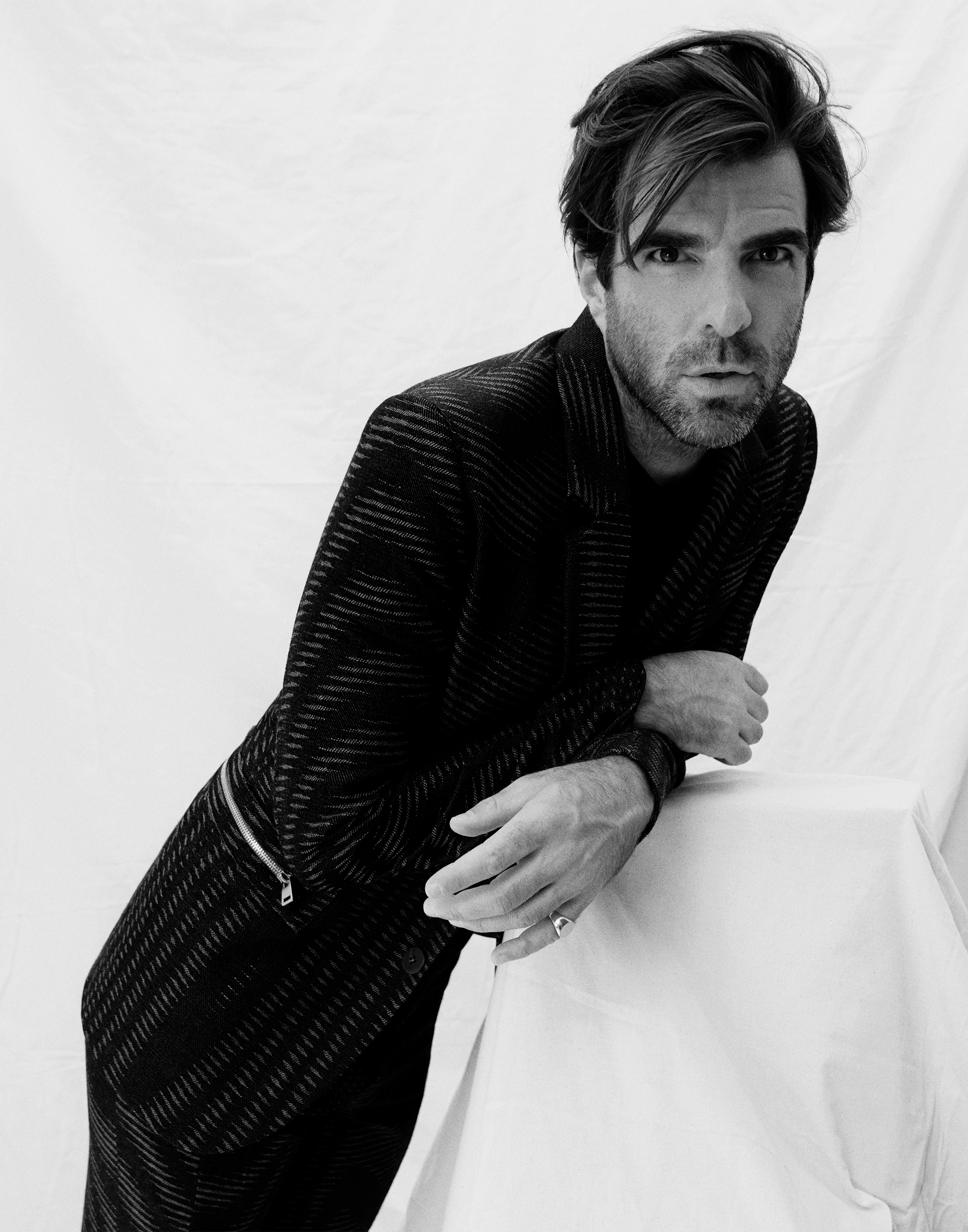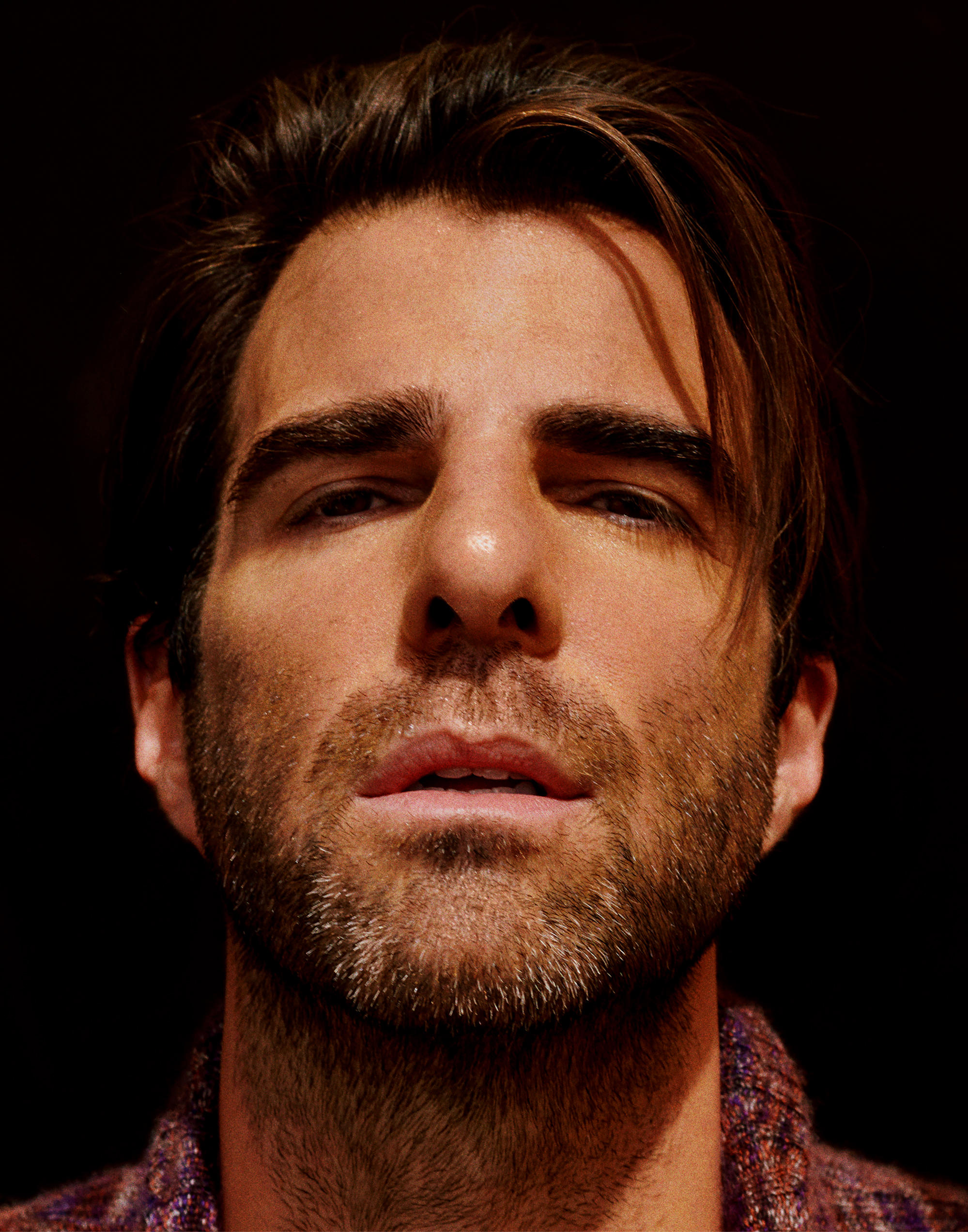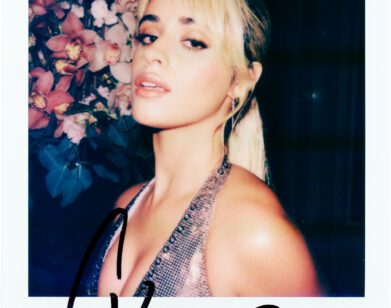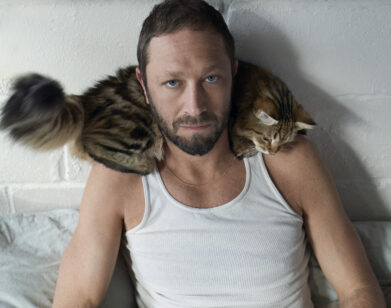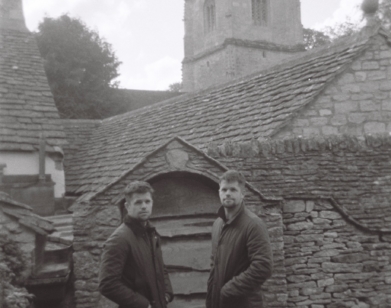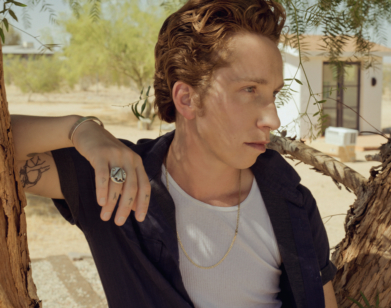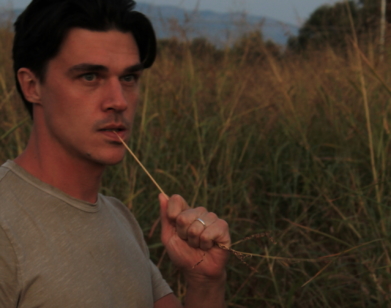in conversation
Zachary Quinto and Sarah Paulson Let Themselves Lose Control
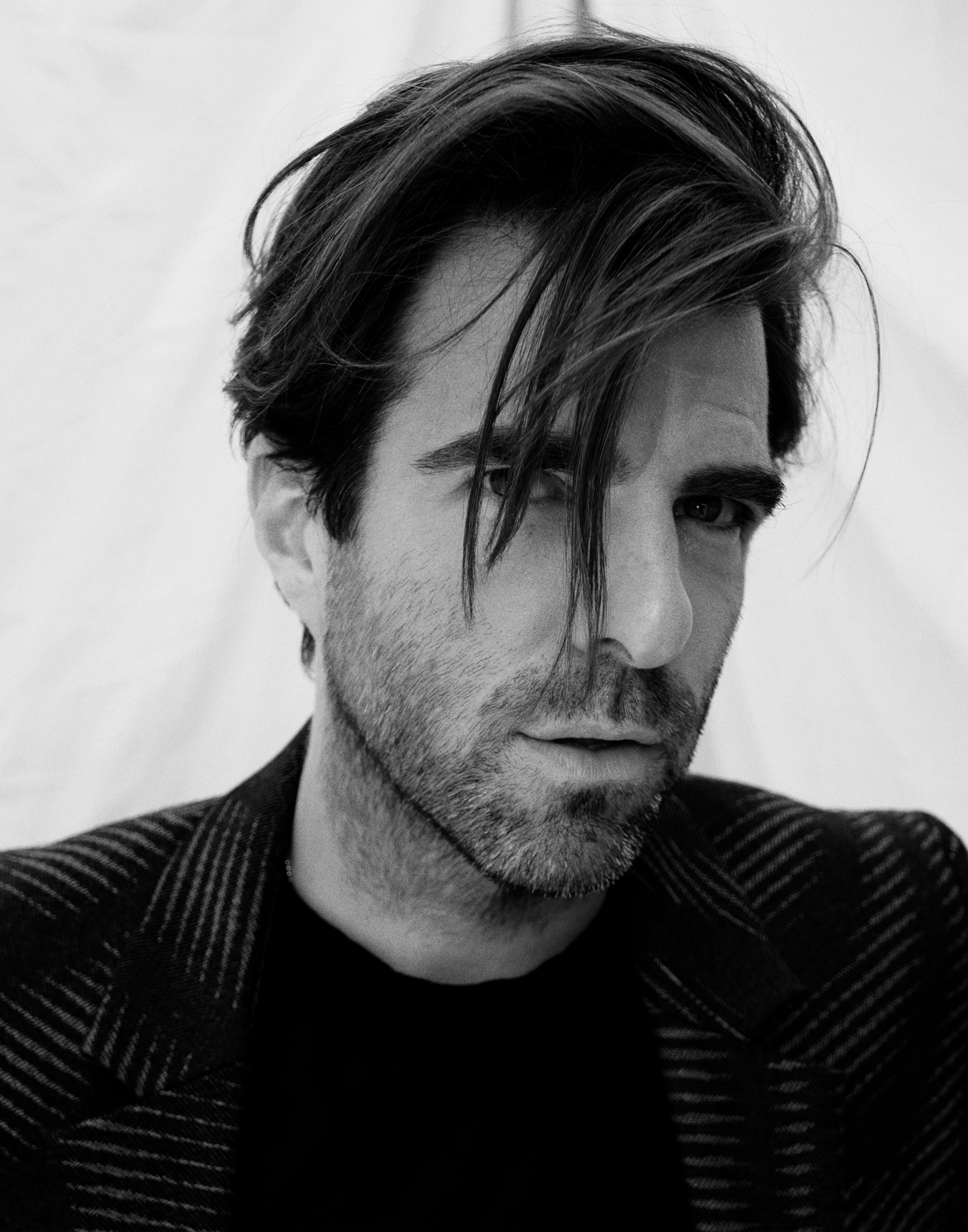
T-Shirt by James Perse. Jacket by Ermenegildo Zegna XXX.
Zachary Quinto isn’t afraid of taking risks, whether it’s giving life to a beloved sci-fi icon in Star Trek, playing a murderous psychiatrist on American Horror Story: Asylum, for which he earned an Emmy nomination, or portraying a child-eating monster in AMC’s NOS4A2. Most recently, the actor embraced yet another challenge by reprising the role of Harold, a performance he first brought to life on Broadway, in the Netflix film adaptation of Mart Crowley’s play The Boys in the Band, alongside the rest of the all-gay cast of the 2018 production, including Matt Bomer, Jim Parsons, and Andrew Rannells. This sort of twice-in-a-lifetime opportunity gave Quinto the rare chance to hone in on and further develop his mystic, handsome, and impenetrable character. As he tells Sarah Paulson, his friend and fellow member of the Ryan Murphy company, getting lost in the experience, both personally and professionally, is something he’s learning to enjoy. —ERNESTO MACIAS
SARAH PAULSON: Hi, friend.
ZACHARY QUINTO: Hello. How are you? Thanks for doing this.
PAULSON: Nothing could make me happier than to have a directive to speak to you for 45 minutes.
QUINTO: Can we FaceTime for ten minutes after this to have a postmortem?
PAULSON: Yes. So, how are you? What is River doing right now, that dog that I think I met the second day you had him when you rescued him off the streets of Los Angeles?
QUINTO: He is chasing a ball up and down the hallway that I’m kicking for him. He loves to make some mischief at the house while we’re all locked up here.
PAULSON: Do you mind sharing the story about discovering River? You were feeling the pull of a dog. I think it’s a beautiful story, especially since River has turned out to be such a magical dog.
QUINTO: He’s pretty magical. I mean, I was not in the market for another dog, as you well know. I’ve had dogs for many years and I love them.
PAULSON: The great Noah.
QUINTO: He was a real special creature, and then when Noah passed away, it was just me and Skunk—Skunk’s my little guy that I’ve had now for about eight or nine years. I felt like that was it for the time being. I was in L.A. for work for a few weeks and I was driving to visit a friend out in the vicinity of Pasadena, which is where I rescued Noah from the Pasadena Humane Society, before we shared a beautiful life for 14 years. As I was driving, I got this overwhelming feeling of Noah energy. I don’t know how else to say it. I even said to myself in the car, “I’m feeling a lot of dog energy right now.” I was going to visit my best friend, so we get in my car and I start to drive us to the Pasadena pound and three blocks from her house, I pull up to a stop sign and I look to the left and standing on the side of the road is this beautiful, tiny little three-month-old German shepherd mixed puppy and I was like, “What is actually happening right now?” I pulled the car over and it was just like a fated event. I just scooped him up and put him in my car and he had no collar and no tags and I took him to the pet store and got him a leash and a collar.
PAULSON: There’s something about that story that just speaks to me. You were attuned enough to what you were sensing, and I don’t mean in some psychic way. This idea of being attuned enough to your own internal musings that you could feel it and then there was your dog.
QUINTO: I was supposed to go to Sundance from L.A. the next week, but I canceled my trip. I was like, “I have a dog now, so I’m not going.”
PAULSON: I’ve always found you to be a kind of inspiring figure in my life. How long was it after Star Trek that you came out? I mean, there was a public declaration of something that was certainly not secret in your private life. I had yet to do that in a declarative way. I found it very inspiring and stirring, just the way you live your life. You’ve taken me to some places with the extraordinary app that is Marco Polo. I’ve gotten to be with you on some of your wild travels.
QUINTO: Now, I just watched The Social Dilemma, so I’m going to be honest. I don’t know how long any of that stuff is going to stay on my phone, but you’re the one who introduced me to the wonders of that app, and you’re one of the only people with whom I consistently interact on there. There is something really lovely to knowing that we can just leave little remembrances of one another on there. I don’t know about you, but I definitely have been going through these waves of existential despair in terms of how curtailed our freedoms have become in terms of traveling. I just love to travel so much. I left New York at the end of March, and I got out of the city, and then I came to L.A. I haven’t really been back to New York. I just couldn’t let myself really be faced with how different the city is now under the circumstances. Obviously, above all else, I’m grateful that I’m safe and okay. There’s something about this longing that’s borne of this time. I’m working to allow it, and I’m working to exist in it. I think it’s important, actually.
PAULSON: It’s weird too because FaceTime has become… I don’t talk to anybody on the phone anymore. But now it just feels like that need to really put a face to a voice.
QUINTO: Some modicum of connection, more than a voice. As much as there is this destabilization that seems to be happening right now because of the pervasive influence of technology and the chaotic integration of it into our political discourse and in our social fabric—at least we can see each other and have real-time experiences, and that’s been a salvation for me both personally and creatively during this time.
PAULSON: Was The Boys in the Band the last time you were on a set?
QUINTO: I finished the movie and then I went and finished season two of NOS4A2 right in the middle of January.
PAULSON: I have to say, it’s a bit unnerving. I fear for a little bit of the joyless experience because some of the new protocols are going to mean that we may not even see the props department in any meaningful way. We may not even come in contact with set deck and production designers and all those things, where I would love seeing them when they come by and complimenting them on their incredible work. By the way, who was the production designer on The Boys in the Band, the movie? I thought it was so amazing, the way that set looked.
QUINTO: You’ve opened up a couple of cans of worms here. Going back to work, the necessary protocol that everybody is going to have to endure is overwhelming to me. And it was Judy Becker, and she did an amazing job. I really agree. I’ve gotten offered a couple of things in the last month or so, and it’s so interesting because I find my criteria has really changed in terms of maybe I would’ve said yes to one or both of those things a year ago, but now, there’s this whole other consideration that we have to make. Do I want to leave the relative safety of my environment right now, and put myself in an environment where there’s a lot of unknown variables?
PAULSON: There’s the decision-making process, where you’re no longer just thinking about what is this creatively going to be like for you, but is there anything fulfilling or fruitful about the exploration of whatever character is being presented.
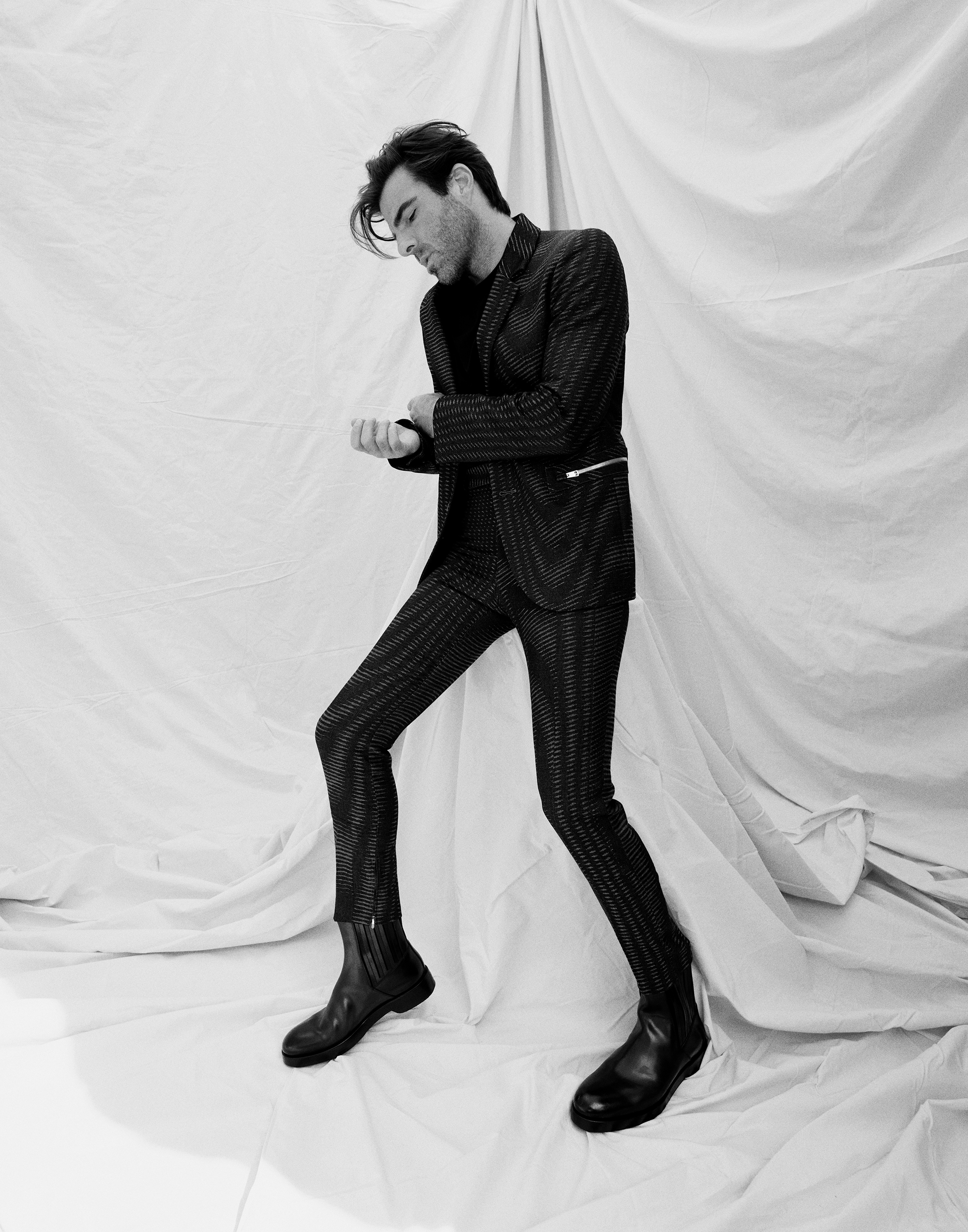
T-Shirt by James Perse. Jacket, Pants, and Boots by Ermenegildo Zegna XXX. Ring by Tiffany & Co.
QUINTO: As much as I’m definitely hungry, as I’m sure everybody is, to return to some semblance of normalcy and have some outlet creatively, I believe on some deep level that it will reveal itself and it will emerge when the time is right. I trust that implicitly.
PAULSON: When I saw the play, and when I watched the movie, Harold is very—there’s a kind of tightness to him. Sometimes I think work that seems tight, meaning in character, can only be played by people who are truly free in their creative self. It’s a hard thing to even talk about with any articulation or clarity. I did work with you in the earlier part of my career. We had to do all these crazy, intimate, dark things, and you and I never spent time breaking scenes down and trying to figure out how to do this—it was instinctual, both of us looking at each other on a high wire and the trapeze bar swings your direction and we just both jumped.
QUINTO: Are we on a high wire or a trapeze? They’re different things.
PAULSON: We’re on a high wire towards the trapeze. Yeah, man. That’s right.
QUINTO: Fair enough.
PAULSON: American Horror Story is about as complicated and as multi-metaphor of a story as you could possibly get. I think the incongruity of that works just fine for me.
QUINTO: In Harold, I haven’t had as much fun playing a character in a really long time, because I feel like, first of all, he’s a delicious person. As catty or caustic as he can be, he’s also incredibly self-aware, and I think in many ways—obviously, some of my castmates may disagree—Harold’s the most fully realized of any of the characters in the story, because he has so deeply examined his own self-loathing.
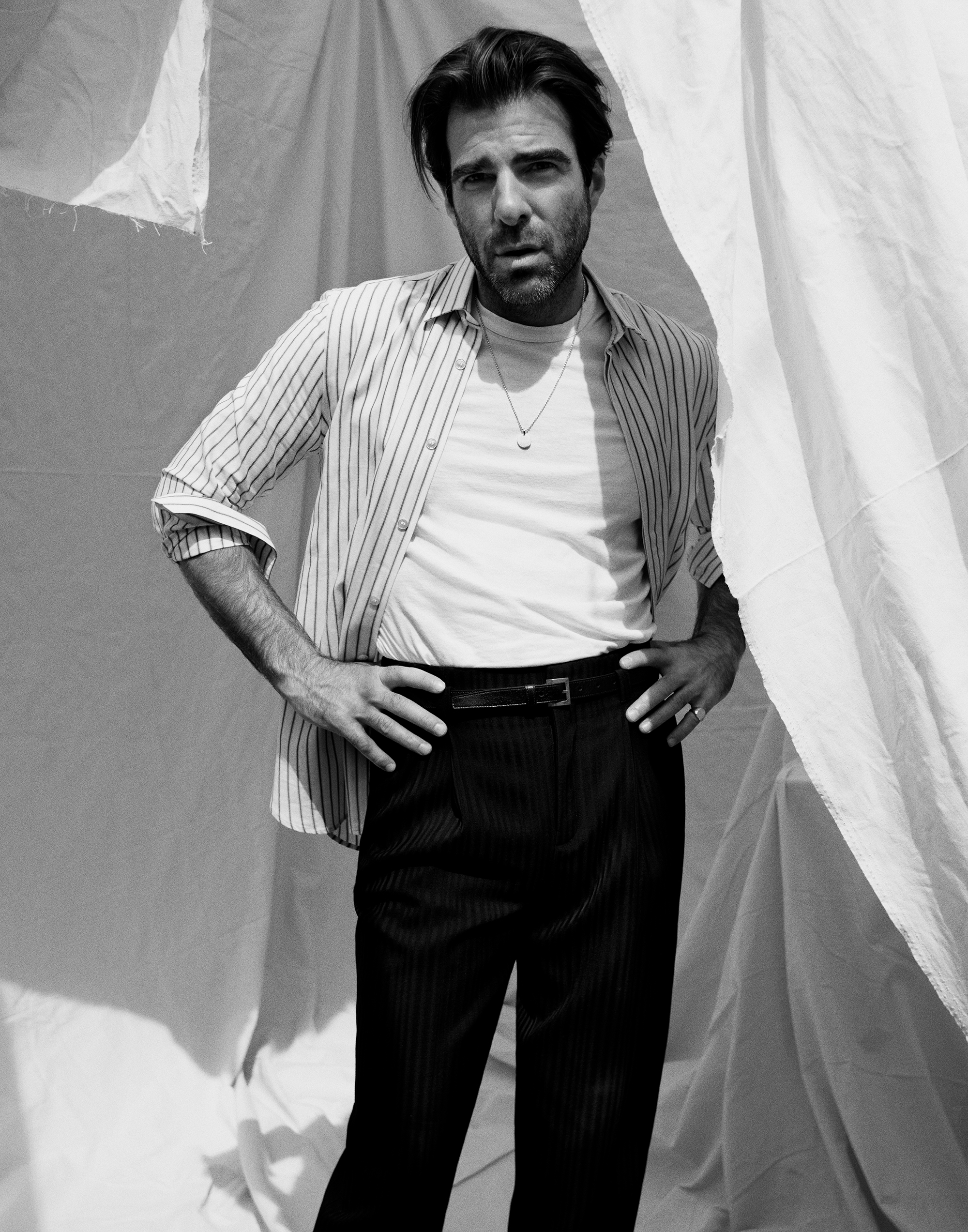
T-shirt by James Perse. Shirt, Pants, and Boots by Saint Laurent. Necklace and Ring by Tiffany & Co.
PAULSON: He can live there.
QUINTO: He can do away with the pretense of it. This is who he is, and there are no apologies, and there is no real moveability but he’s so above it all that it’s almost difficult to reach him. I love that aspect of him. I think that our experience on American Horror Story… all I can remember about that time is laughing with you.
PAULSON: You were just starting banjo. You could only play the “Rainbow Connection.” It was like 120 hours a day. We shared a trailer and all I could hear was “Rainbow Connection.”
QUINTO: That’s why I bought the banjo. I need something to do that will engage me creatively but that I can put down when they say, “We’re ready for you on set.” All these years later, and I’m still playing the banjo, which I love. I remember the joy of that time. It was a really particularly joyful time creatively and personally, and so much of that had to do with our experience on that show and the trust. I just remember that sense of like, we’re going to do crazy—
PAULSON: That’s why I used the high wire and the trapeze thing, man. To give everybody an understanding of how treacherous it was.
QUINTO: It was. Having to, like, suckle your breast was definitely a high wire. But it solidified something for me, which was the way that I love experiences to be, and that was definitely a real touchstone of how I want to work and a benchmark of future experiences—being able to throw myself into something and know without a shadow of a doubt that I will not only be met by my partner but also entirely supported and cared for by my partner. That was a great experience, and I long for it again.
PAULSON: Well, we keep talking about trying to find a play, and now my big fear, I know that it’s small potatoes given what is happening globally and politically in our world right now, but I do long to be in an audience, and I haven’t been on stage in nine years.
QUINTO: Wow, that’s crazy. That was nine years ago that you did Talley’s Folly? Now, of course, my fear around it, is that I wouldn’t know how to do it, or that I would be sort of undone by that experience floating around in my brain from time to time.
PAULSON: It has no place there, because all you would need is the right project, the right director, and to be surrounded by me, and then you’re good.
QUINTO: Having that with you would be really extraordinary. I just don’t know that that’s in the cards in the next immediate future.
PAULSON: Well, we could always go to London. It seems like they’re ahead of the curve.
QUINTO: Let’s do that. Can we get a house together, please?
PAULSON: Because your dog and my dog need to meet.
QUINTO: Our dogs have never met. Winnie and River have never met. River just perked up so much when I said her name. He knows. It’s so interesting having a dog at this stage in my life and being really tuned into the ways that I’ve changed, and the ways that I’ve expanded. I have much more empathy, not only for other creatures but for myself. I think animals are such reflections of how we care for things, how we care for ourselves.
PAULSON: A few questions, please, about this stage versus film experience, because I’m truly interested. I’ve never done a stage piece and then had an opportunity to film it, and with the whole cast. That rarely happens.
QUINTO: Amazing experience. I’ve never had anything come close to the depth of the journey, in terms of my understanding of the character and my trust in the process. There was basically a seven-month rehearsal for the movie, essentially, and then a year between the play and the movie to let all that kind of marinate. I am really proud of this movie on so many levels and proud of [the director] Joe Mantello, and so grateful to have shared this journey with him.
PAULSON: I know what that feeling is like, walking to the theater, and then when you actually get to go and tell a story every night with a group of people you respect and admire and who just bring out the best in you. I just think it’s such a special, almost indescribable thing.
QUINTO: There’s nothing like it. I’ve said before, and I mean it genuinely, if you told me right now that I could never do another movie or another TV show for the rest of my career, but I could do whatever play I wanted whenever and go from play to play to play, I would sign right now. There’s just something about the theater that I feel like exists on a level that just simply can’t exist anywhere else.
PAULSON: It’s just a profound experience that I have to say I am missing terribly.
QUINTO: I think it really does feed into something else that’s larger than all of us, and the theater acknowledges that and captures that.
PAULSON: Has anything become clearer or come into sharper focus, in terms of what your creative wants are going forward?
QUINTO: A lot of my work has been about understanding how to exist in the discomfort that can be expansive. The surrender can be inspiring. So that’s how I’ve been spending a lot of my time. I feel sensitivity to other people’s experiences. Obviously in midst of all the pandemic stuff, and the social uprising of Black Lives Matter, I think an idea of how to connect with other people who come from different experiences, and that translates to the kinds of stories I want to tell as a producer. There is this quiet seed that’s been planted in me that’s really about trust and giving over to the experience, both in my life and in my work. I hope that’s something that I’m able to bring with me wherever I go, and I hope it’s something that proves to be a positive outcome from all of this upheaval, chaos, and uncertainty.
Grooming: Patricia Morales


